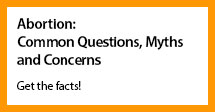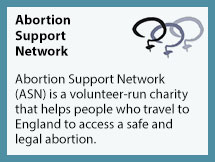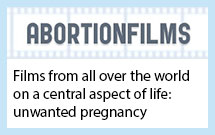Myths & facts
See also the Fact-Sheet: [download pdf ]
You’re pregnant, and you don’t want to be. You’re thinking about having an abortion, but you’re confused. When you googled abortion, a lot of scary information came up.
Before you can make a decision about what’s best for you, it’s a good idea to get the real facts about abortion. Here are some common questions and the factual answers.
1. Will I be able to get pregnant again?
Safe, uncomplicated abortion does not affect a woman’s ability to have children in the future. On the contrary, the present pregnancy is proof of your fertility and the next ovulation will occur 10-14 days after an abortion. And you can get pregnant again if you don’t use highly effective contraception.
It does not:
- cause birth defects
- cause premature birth or low infant-birth weight
- make ectopic (not in the uterus) pregnancy more likely
- make miscarriage more likely
- make the risk of infant death more likely
Abortion is a very safe procedure. It’s about twice as safe as having your tonsils removed, and is 10 times safer than giving birth if it is performed before the 18th week of pregnancy. Most abortions — 90 percent — are performed in the first 12 weeks of pregnancy.
2. Will I get “post-abortion stress syndrome”?
Despite overwhelming scientific evidence to the contrary, anti-choice organizations continue to spread the false idea that it is common for abortion to have severe, emotionally negative effects. They want people to believe that most women who choose abortion suffer severe and long-lasting emotional trauma. This is not true. In fact, studies show that most women, in the long-term, experience feelings of relief after they have an abortion.
Anti-abortion groups have invented this so-called “post-abortion syndrome” to further their efforts to make abortion illegal. But neither the American Psychological Association nor the American Psychiatric Association recognizes the existence of so-called “post-abortion syndrome.” These medical professionals found the anti-choice research flawed. For example, the authors of many “post-abortion syndrome” studies only interviewed women who claimed to have emotional problems after an abortion procedure.
About 20 percent of women who have abortions experience symptoms of depression that pass fairly quickly. This is also true for 70 percent of women immediately after childbirth. These passing depressions — after abortion or childbirth — are most frequently caused by the drastic shifts in hormones that occur after either experience. Up to 10 percent of women who have abortions experience lingering symptoms of depression. This is also true of 10 percent of women after childbirth.
But in all, most scientific studies have found that long-term emotional reactions to having an abortion are relatively positive. In general, women at high risk for ongoing psychological problems after abortion — or childbirth — are women who have psychological problems before their pregnancies. And women who have to terminate a wanted pregnancy for medical reasons are more likely than other women to be emotionally disturbed afterward.
3. Does abortion cause breast cancer?
Abortion does not cause or increase the risk of breast cancer. The myth that breast cancer and abortion are linked is primarily promoted by groups and individuals who oppose abortion regardless of its safety. It is an idea used to frighten women away from having an abortion.
In 2003, the federal government put together a team of researchers to review the many studies that have been conducted on abortion and breast cancer. They concluded that there were flaws in the studies that linked abortion and breast cancer. The best studies, including one of 1.5 million women in Denmark, have found no link between cancer and abortion — none.
Eight common myths & truths
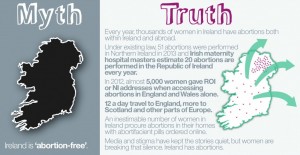 Ireland is abortion-free
Ireland is abortion-freeTruth #1 Ireland is not, never has been, and never will be abortion-free.
www.abortionrightscampaign.ie/myth-1
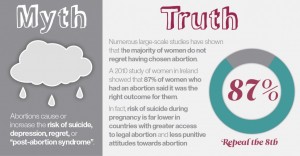 Abortion causes or increases the risk of suicide, depression, and ‘post abortion syndrome’.
Abortion causes or increases the risk of suicide, depression, and ‘post abortion syndrome’.Truth #2: Women have plenty of feelings after abortion, and when they have real access to safe, legal abortion, they are not more at risk of emotional problems.
www.abortionrightscampaign.ie/myth-2
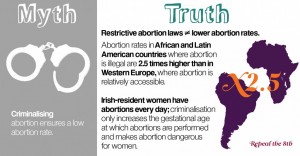 Criminalising abortion ensures a low abortion rate.
Criminalising abortion ensures a low abortion rate.Truth #3: Women have abortions regardless of whether the procedure is legal, and restrictions just make abortions less safe.
www.abortionrightscampaign.ie/myth-3
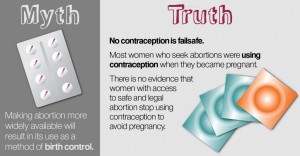 Making Abortion more widely available will result in its use as a method of Contraception/Birth Control.
Making Abortion more widely available will result in its use as a method of Contraception/Birth Control.Truth #4: There is no credible evidence that if abortion was more accessible that sexually active people would use abortion as a method of birth control.
www.abortionrightscampaign.ie/myth-4
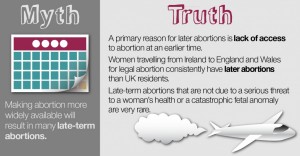 Making Abortion more widely available will result in many late term abortions
Making Abortion more widely available will result in many late term abortionsTruth #5: Where abortion is prohibited or difficult to access, the chances are higher for late-term abortions to occur.
www.abortionrightscampaign.ie/myth-5
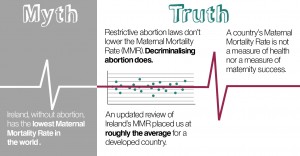 Ireland, without abortion, is the safest place in the world for pregnant women
Ireland, without abortion, is the safest place in the world for pregnant womenTruth #6:The fact is: Ireland’s Maternal Mortality Rate is roughly average for a developed country. In fact, many countries providing women with access to safe and legal abortion report below-average MMRs.
www.abortionrightscampaign.ie/myth-6
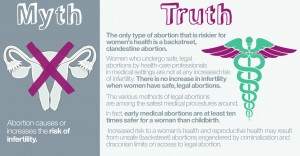 Does abortion cause or increase the risk of infertility?
Does abortion cause or increase the risk of infertility?Truth #7: The only type of abortion that is riskier for women’s health is a backstreet, clandestine abortion
Women who undergo safe, legal abortions by health-care professionals in medical settings are not at any increased risk of infertility when women have safe, legal abortions.
www.abortionrightscampaign.ie/myth-7
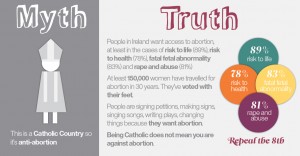 Ireland is ‘pro-life’ (because it’s a Catholic country)
Ireland is ‘pro-life’ (because it’s a Catholic country)Truth #8:Being Catholic does not mean you are anti-abortion. At least 150,000 women have travelled from Ireland for an abortion in the last 30 years.
www.abortionrightscampaign.ie/myth-8
THE FACTS SPEAK LOUDER THAN THE MYTHS
Everyone deserves information that is medically accurate and untainted by a political agenda. When considering abortion, talk to a trusted health care provider, and make sure you have information that is accurate and unbiased. If you need an appointment to discuss your own options for an unintended pregnancy, contact your local Planned Parenthood health center.
POST-ABORTION SYNDROME
Many people are interested in learning about the possible effects of abortion on women’s emotional well-being, and several hundred studies have been conducted on this issue since the late 1970s. Unfortunately, much of the research on women’s psychological responses to abortion can be confusing. Nonetheless, mainstream medical opinions, like that of the American Psychological Association, agree there is no such thing as “post-abortion syndrome.”
Read more: prochoice
Scientific results: syndrome
THE ABORTION AND BREAST CANCER MYTH
No causal relationship between abortion and breast cancer has been scientifically established. Nevertheless, the anti-choice community continues to claim an association between abortion and an increased risk of breast cancer. Through propaganda, poorly designed and interpreted research studies, and misinformation, anti-choice groups attempt to dissuade women from choosing abortion by exploiting their fear of breast cancer.
In fact, in March of 2003 the National Cancer Institute (NCI) declared emphatically that “newer studies consistently showed no association between induced and spontaneous abortions and breast cancer risk.” NCI convened a symposium of over 100 of the world’s leading experts to review existing studies on the relationship between pregnancy, abortion, miscarriage and breast cancer risk and concluded that having an abortion does not increase a woman’s subsequent risk of developing breast cancer.
And yet anti-choice groups continue to wage well-publicized campaigns to spread their misleading information. These groups were behind recent attempts to pressure the NCI to change its patient information on abortion and breast cancer. NCI ultimately realized the need to base policy decisions on science and not political pressure, but other agencies may not be so vigilant. Armed with data from flawed or inappropriately interpreted research studies, anti-choice forces are lobbying state legislators for laws that mandate discussion of an increased risk of breast cancer as a recognized risk of abortion.
Women deserve accurate information, not anti-choice scare tactics.
Read NAF’s fact sheet on the Abortion and Breast Cancer Myth.
download pdf: prochoice.org
Mandating Misinformation in the Doctor’s Office
Anti-choice forces are even willing to intrude upon the doctor-patient relationship. Several states have enacted laws mandating the discussion of an increased risk of breast cancer as a risk of abortion. Such laws force doctors to choose between misleading their patients and obeying the law.
WHEN POLITICS AND SCIENCE MIX
Breast cancer is a very important health concern for women, and discovering both the causes of and effective treatments for breast cancer is something that needs to be a top priority for further research. However, we know that politicizing scientific issues is dangerous to public health.
If you want to read more: prochoice
WHAT ARE CRISIS PREGNANCY CENTERS?
Crisis pregnancy centers (CPCs) advertise themselves as unbiased health centers with services such as free pregnancy tests, HIV tests, and “abortion alternatives.” Women are often lured into CPCs only to find that the staff members usually have no professional training and the environment is filled with inaccurate, anti-choice information.
By calling themselves “Women’s Resource Centers” or “Loving Care Pregnancy Centers,” CPCs mislead women to think they are clinics that provide a full range of services. And CPCs will often locate themselves near legitimate reproductive health centers, confusing women even further.
It’s common for CPCs to use misleading films, ultrasound pictures, and written materials to scare and emotionally manipulate women into continuing their pregnancies. By presenting women with false information about abortion and the development of the fetus, CPCs threaten women’s abilities to make informed choices.


